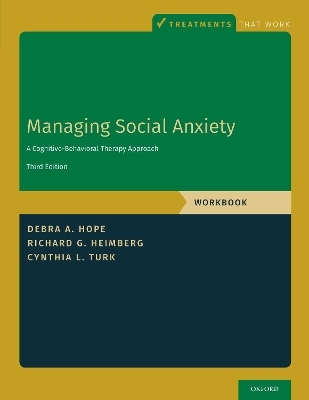
Managing Social Anxiety, Workbook
Oxford University Press Inc (Verlag)
978-0-19-024763-8 (ISBN)
Social anxiety is a common problem that can occur in situations ranging from dating to conversations to job interviews. Fortunately, three decades of research have shown that most people struggling with social anxiety can benefit from the treatment described in Managing Social Anxiety.
The third edition of this Workbook provides essential information on the nature of social anxiety and the scientifically supported cognitive-behavioral techniques used to treat it. Readers may use it as part of therapy with a mental health professional or on their own. This new edition is fully updated with current science and clinical findings, a greater emphasis on multicultural experiences of social anxiety, and much more. Complete with user-friendly forms and worksheets, as well as relatable case examples and chapter review questions, this workbook contains all the tools necessary to help readers manage anxiety and improve quality of life.
Debra A. Hope is a professor in the Department of Psychology at the University of Nebraska-Lincoln. She has published over 110 books and papers on topics related to social anxiety, cognitive-behavioral treatment, dissemination of evidence-based treatments and the mental health impacts of stigma on gender and sexual minorities. Professor Hope is Past President of the Association of Behavioral and Cognitive Therapies and past Associate Editor of Clinical Psychology: Science and Practice and Cognitive Therapy and Research. Richard G. Heimberg is the Thaddeus L. Bolton Professor of Psychology at Temple University, where he also directs the Adult Anxiety Clinic. He is well known for his efforts to develop and evaluate models and treatments for social anxiety disorder. He has published 12 books and more than 450 papers on social anxiety, CBT, and related topics, and was recently listed among the top 1% of cited authors in his field according to Thomson Reuters. Dr. Heimberg is Past President of the Association for Behavioral and Cognitive Therapies and of the Society for a Science of Clinical Psychology, and Past Editor of Behavior Therapy. Cynthia L. Turk is a professor in the Psychology Department at Washburn University, where she serves as the department chairperson. She is Past President of the Southwestern Psychological Association. She has over 60 professional publications and over 100 professional presentations, primarily in the areas of social anxiety disorder and generalized anxiety disorder. She teaches graduate courses in psychopathology and psychotherapy techniques and supervises master's students in the Washburn University Psychological Services Clinic where she directs the Anxiety Clinic. Dr. Turk is a licensed psychologist.
Chapter 1
The Invitation: Are You Ready to Begin the Journey to Overcome Social Anxiety?
Chapter 2
Starting Our Journey Together from the Same Place: Understanding Social Anxiety
Chapter 3
The Origins of Social Anxiety
Chapter 4
Plotting the Road Map for Our Journey: Gathering Information on the Situations That Are Difficult for (But Important to) You
Chapter 5
Identifying the Thoughts That Cause Anxiety
Chapter 6
Tools to Challenge Your Automatic Thoughts
Chapter 7
Getting into the Pool: The First Exposure Session
Chapter 8
Settling into the Journey: The Ongoing Routine of In-Session and Homework Exposures
Chapter 9
Additional Tools for Challenging Your Automatic Thoughts
Chapter 10
Everything Starts With Small Talk
Chapter 11
Public Speaking
Chapter 12
Advanced Cognitive Restructuring: Addressing Core Beliefs
Chapter 13
Getting Ready to Continue the Journey on Your Own: Consolidating Gains and Finishing Treatment
Appendix
Self-Assessment Answers
| Erscheinungsdatum | 15.11.2019 |
|---|---|
| Reihe/Serie | Treatments That Work |
| Verlagsort | New York |
| Sprache | englisch |
| Maße | 218 x 278 mm |
| Gewicht | 658 g |
| Themenwelt | Geisteswissenschaften ► Psychologie ► Persönlichkeitsstörungen |
| Medizin / Pharmazie ► Medizinische Fachgebiete ► Psychiatrie / Psychotherapie | |
| ISBN-10 | 0-19-024763-0 / 0190247630 |
| ISBN-13 | 978-0-19-024763-8 / 9780190247638 |
| Zustand | Neuware |
| Haben Sie eine Frage zum Produkt? |
aus dem Bereich


